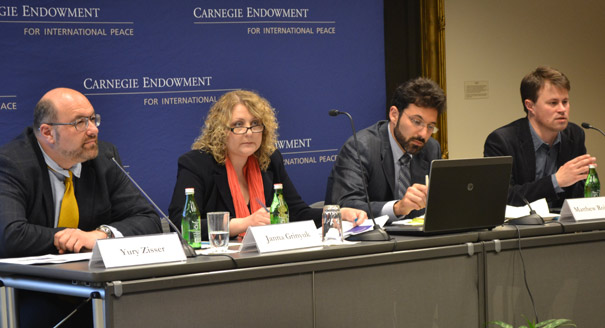Registration
Thank you!
You will receive an email confirming your registration.
Despite limited international engagement with Belarus, the situation in the country continues to evolve. To discuss the latest developments in Belarus, Balázs Jaráblik of Pact introduced Yury Chavusau, legal adviser for the Assembly of Pro-Democractic NGOs, Janna Grinyuk, founder and CEO of the Center of System Business Technologies, and Yury Zisser, creator and founder of TUT.BY, the most visited Belarusian web portal. Carnegie’s Matthew Rojansky moderated.
Political Outlook
- Internal Situation: The regime has managed to overcome the effects of the economic crisis through external Russian assistance, said Chavusau. Despite the stabilization of the economic outlook, Lukashenka’s popularity has not been restored to pre-crisis levels, he added.
- External Relations: The main partner for Belarus continues to be Russia, which provides vital loans in exchange for privatization access, Chavusau continued. Although there is ongoing dialogue with the EU for Belarusian modernization, officials in Minsk resent EU conditions on cooperation.
- Political Opposition: Even though the majority of the population wants to see change in the country, there is relatively little support for the opposition, stated Chavusau. Moreover, there is scant public sympathy for political prisoners, he added.
- Sanctions: Western sanctions have hurt Belarusian businesses without impacting the regime, said Zisser. Instead of pursuing additional sanctions, the West should engage the government in dialogue, agreed Chavusau.
Popular Outlook
- Civil Society: Despite continued criminal liability for unregistered NGOs, there is more space for activism within the public sphere, argued Chavusau. Involving Belarusians in people-to-people contacts with the West is the most effective way of fostering change and reforms, added Zisser.
- Opinion Polls: According to survey data, the majority of the population has grown disillusioned with politics, said Grinyuk. Despite fears of openly criticizing the government, most support reforms and perceive the country to be in a state of economic crisis, she added. She added that public perceptions of the West are still problematic, citing the fact that 88 percent of Belarusians view Russia as an ally, while 41 percent see the United States as an enemy.
- Internet: The majority of the population has access to high-speed internet, and there are only a handful of restricted websites, said Zisser. While the popularity of Russian news outlets has been increasing, there is still a gap between the traffic of nonpolitical websites and news websites, he added.
Travel for this delegation was supported by USAID and Pact.
